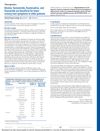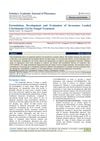 October 2015 in “Annals of Internal Medicine”
October 2015 in “Annals of Internal Medicine” Dutasteride, fesoterodine, and finasteride help older patients with urinary issues.
 16 citations,
October 2018 in “Biochemical and Biophysical Research Communications”
16 citations,
October 2018 in “Biochemical and Biophysical Research Communications” Sildenafil, often used for erectile dysfunction, may help hair growth.
 15 citations,
June 2018 in “Food Reviews International”
15 citations,
June 2018 in “Food Reviews International” Pumpkin seed oil may improve prostate health, bladder control, and hair growth in men.
 2 citations,
March 2004 in “Reviews in Gynaecological Practice”
2 citations,
March 2004 in “Reviews in Gynaecological Practice” Hormonal changes and psychological issues can cause sexual dysfunction in postmenopausal women. Behavioral therapy is recommended first, with hormone replacement helping some symptoms but not libido. Testosterone can improve libido, but its effects on overall sexual function are unclear. Emotional and relationship issues should be addressed before using medication, and the benefits and risks of testosterone supplementation should be considered.
 1 citations,
June 2010 in “Mayo Clinic Proceedings”
1 citations,
June 2010 in “Mayo Clinic Proceedings” The conclusion is that individualized treatment and proper medication use are crucial in men's health, with specific recommendations for ED, BPH, and prostate cancer management.
 April 2024 in “International journal of impotence research”
April 2024 in “International journal of impotence research” Some men experience persistent sexual, neurological, and psychological symptoms after stopping finasteride, but evidence of permanent damage is inconclusive.
 38 citations,
February 2019 in “Clinical Interventions in Aging”
38 citations,
February 2019 in “Clinical Interventions in Aging” Dutasteride more effectively treats hair loss than finasteride, but may increase risk of altered libido.
 20 citations,
June 2015 in “Hormone Molecular Biology and Clinical Investigation”
20 citations,
June 2015 in “Hormone Molecular Biology and Clinical Investigation” Finasteride worsens erectile dysfunction and lowers testosterone in men with enlarged prostates, unlike tamsulosin.
 7 citations,
January 2019 in “The Aging Male”
7 citations,
January 2019 in “The Aging Male” Post-finasteride syndrome's existence is uncertain; more research needed.
 185 citations,
March 2011 in “The Journal of Sexual Medicine”
185 citations,
March 2011 in “The Journal of Sexual Medicine” Finasteride for hair loss can cause long-lasting sexual side effects like low libido and erectile dysfunction.
 127 citations,
June 2008 in “British Journal of Clinical Pharmacology”
127 citations,
June 2008 in “British Journal of Clinical Pharmacology” Low doses of some substances can be beneficial, while high doses can be harmful or toxic.
 28 citations,
May 2013 in “The Journal of Steroid Biochemistry and Molecular Biology”
28 citations,
May 2013 in “The Journal of Steroid Biochemistry and Molecular Biology” Testosterone therapy can improve sexual desire and function in postmenopausal women but should be used cautiously and not based solely on testosterone levels.
 24 citations,
December 2009 in “Future Medicinal Chemistry”
24 citations,
December 2009 in “Future Medicinal Chemistry” Using computers to analyze drugs can find new uses for them, but actual experiments are needed to confirm these uses.
 21 citations,
July 2018 in “The Journal of Sexual Medicine”
21 citations,
July 2018 in “The Journal of Sexual Medicine” The 2018 update to the ED care model added a new severity score and stressed a detailed evaluation of both physical and psychological aspects.
 3 citations,
September 2014 in “Journal of obstetrics and gynaecology Canada”
3 citations,
September 2014 in “Journal of obstetrics and gynaecology Canada” Menopause often leads to lower sexual desire and discomfort during sex, but treatment should be personalized and only if it bothers the woman.
 14 citations,
December 2007 in “Journal of The European Academy of Dermatology and Venereology”
14 citations,
December 2007 in “Journal of The European Academy of Dermatology and Venereology” The article concludes that dermatologists should prescribe lifestyle drugs carefully and consider mental health treatments for patients with disorders like BDD.
 5 citations,
April 2021 in “Journal of Endocrinological Investigation”
5 citations,
April 2021 in “Journal of Endocrinological Investigation” Higher DHT levels are linked to fewer hypogonadism symptoms in men with normal testosterone levels.
 8 citations,
July 2018 in “Current Sexual Health Reports”
8 citations,
July 2018 in “Current Sexual Health Reports” Finasteride can cause lasting sexual dysfunction, depression, and other side effects, needing more research for treatment.
 August 2022 in “Scholars academic journal of pharmacy”
August 2022 in “Scholars academic journal of pharmacy” Invasomes loaded with clotrimazole gel could improve drug delivery through the skin for fungal treatment.
 2 citations,
April 2023 in “Pharmaceuticals”
2 citations,
April 2023 in “Pharmaceuticals” Testosterone therapy for postmenopausal women appears safe and may protect against heart disease, but requires constant monitoring and more research for long-term effects.
3 citations,
January 2018 in “Elsevier eBooks” Serenoa repens is a common and effective plant-based treatment for mild-to-moderate prostate enlargement symptoms.
14 citations,
May 2016 in “Therapeutic advances in urology” Taking tadalafil and finasteride together is safe and effective for treating urinary symptoms and erectile dysfunction in men with enlarged prostates.
 February 2024 in “Urology”
February 2024 in “Urology” Certain medications, especially Paroxetine, Tamsulosin, and Finasteride, are linked to ejaculatory disorders.
 2 citations,
February 2023 in “BJUI”
2 citations,
February 2023 in “BJUI” Urologists should monitor mental health in patients taking finasteride due to potential links to suicidal thoughts, adjusting dosage or stopping use if necessary. More research is needed to confirm if finasteride causes these thoughts.
 10 citations,
January 2019 in “Archives of Endocrinology and Metabolism”
10 citations,
January 2019 in “Archives of Endocrinology and Metabolism” Testosterone therapy may slightly increase sexual desire in women with HSDD but lacks broad recommendation due to safety concerns and limited approval.
 658 citations,
June 2003 in “Endocrine reviews”
658 citations,
June 2003 in “Endocrine reviews” Male hormones may play a role in the development of heart disease, and more research is needed to understand their effects.
 25 citations,
May 2012 in “The Journal of Sexual Medicine”
25 citations,
May 2012 in “The Journal of Sexual Medicine” Finasteride reduces corpus cavernosum weight but doesn't affect erectile response in rats.
8 citations,
October 2021 in “The international journal of risk and safety in medicine” The document sets criteria for diagnosing long-term sexual dysfunctions caused by certain medications.
20 citations,
April 2023 in “The Journal of Urology” PRP is safe but not more effective than a placebo for treating mild to moderate erectile dysfunction.
 35 citations,
January 2012 in “The Journal of Sexual Medicine”
35 citations,
January 2012 in “The Journal of Sexual Medicine” Androgen Deprivation Therapy for prostate cancer often reduces sexual function but intermittent therapy may be more tolerable.


























